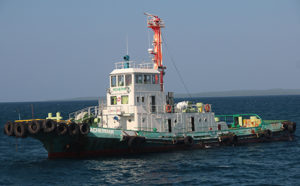
Starting December 6, compulsory tug assistance at 14 ports will be suspended, according to the Philippine Ports Authority (PPA).
“In the exigency of service, compulsory tug assistance, by virtue of several Administrative Orders, is hereby suspended until further notice in the PMOs (port management offices) where said service was declared by PPA,” PPA Administrative Order (AO) No. 06-2016 states.
These PMOs are the Manila International Container Terminal, South Harbor, Batangas, Davao, Cagayan de Oro, General Santos, Zamboanga, Iloilo, Surigao, Dumaguete, Pulupandan, Ozamiz, Iligan, and Naispit.
PPA said, however, compulsory service may still be required in certain conditions as determined by the Philippine Coast Guard. These are when a strong current has a velocity of four knots or more and affects the maneuvers of vessels; when velocity and direction of air current is traveling at 30 to 50 kilometers per hour; and when there is inclement or stormy weather or a tropical depression in the area during the vessel’s maneuvers.
Requiring compulsory tug assistance should also consider the conditions of the port or the approach to the berth, the port structures and facilities, location of the berth, and limited maneuvering space for the vessel.
Moreover, instances of mechanical defect, such as the sudden malfunctioning of the engine, propulsion, or navigational equipment, that render the vessel incapable of maneuvering, will still require tug assistance.
As a policy, PPA said, “any ship that causes damage to the port shall be held liable and shall be detained until such time that a Marine protest has been filed and the concerned shipping company obligates itself to completely defray the cost of damage including the cost of opportunity loss as prescribed in PPA Memorandum Circular No. 14-2014.”
Both the Philippine Inter-island Shipping Association (PISA) and Philippine Liner Shipping Association (PLSA) told PortCalls they welcome the suspension of tug assistance, saying it will help reduce costs for domestic carriers.
PLSA said some ports with mandatory tug assistance do not actually have tugs, requiring shipping lines to get them from other ports at additional cost.
And sometimes, pilots, whose assistance is also required at some PPA ports, supposedly take advantage of this by forcing shipping lines to avail of the pilots’ own tug services.
At some ports with no available tugs, some pilots conduct the docking with extra charge. However, PISA executive director Pedro Aguilar said this defeats the purpose of tug assistance because “how can your software side (pilotage) replace the hardware requirement (tug boat)?”
He said if pilots can replace tugs, then masters of ships can do the same at no extra charge, because pilots in the country are usually retired masters.
Another reason for tug assistance being better as an optional service, the groups said, is that modern ships nowadays already come equipped with bow thrusters, allowing vessels to dock safety unaided.
Harbor tugowners’ reaction
In an email to PortCalls, Harbor Tugowners Association of the Philippines (HTAP) president Geronimo Bella, Jr. said they will seek an audience with PPA to clarify AO 06-2016.
“In all commercially active ports and terminals abroad, tugboats are used to ensure the safety of the vessels, cargo, crew and the ports where the vessels dock in,” said Bella, also the president of Harbor Star Shipping Services, Inc. “These vessels are 100 to 250 meters in length and weigh ranging from 5,000 to 50,000 GRT. How can they be expected to consistently dock safely and timely without tugboats, even under normal conditions?
He added, “An accident involving these vessels will render a port or terminal inoperable for months, which we have seen in the past.”
“We intend to share our experiences with PPA as to why the Philippines should retain compulsory tug assistance especially in ports which are commercially active. We expect privately owned terminals and ports to share our view that, more than anything else, safety is the paramount consideration when foreign vessels dock in any of our Philippine ports,” HTAP added.
HTAP is a Philippine association of harbor tug owners operating in Luzon, Visayas, and Mindanao, whose members collectively dock and undock 75% of all foreign vessels that call Philippine ports and terminals.
As of press time, PortCalls is still waiting for a statement from the Association of International Shipping Lines. – Roumina Pablo





